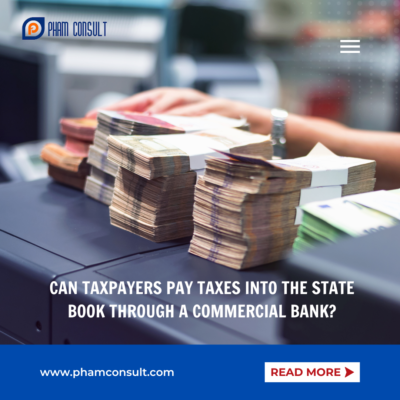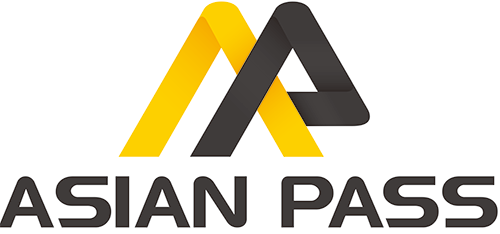Currently, besides paying taxes to the state budget through the Tax Authority, can taxpayers pay taxes to the state budget through commercial banks? Through today’s article, let’s learn more about this issue with Pham Consult!

What is commercial banking?
According to Clause 3, Article 4 of the Law on Credit Institutions 2010, commercial banks are a type of bank that is allowed to carry out all banking activities and other business activities according to regulations with the aim of profit.
Commercial banks are organized in two forms according to Clause 1 and Clause 2, Article 6 of the Law on Credit Institutions 2010, including:
– Domestic commercial banks are established and organized in the form of joint stock companies.
– State-owned commercial banks are established and organized in the form of a one-member limited liability company with 100% charter capital owned by the State.
Can taxpayers pay taxes to the state budget through commercial banks?
The form of tax payment is specified in Clause 1, Article 56 of the Law on Tax Administration 2019 as follows:
Location and form of tax payment
Taxpayers pay taxes into the state budget according to the following regulations:
a) At the State Treasury;
b) At the tax administration agency that receives tax declaration dossiers;
c) Through an organization authorized by the tax administration to collect taxes;
d) Through commercial banks, other credit institutions and service organizations according to the provisions of law.
The State Treasury, commercial banks, other credit institutions and service organizations according to the provisions of law are responsible for arranging locations, vehicles, civil servants and staff to collect tax to ensure convenience for customers. Taxpayers pay taxes promptly into the state budget.
When receiving or deducting tax, agencies and organizations must provide taxpayers with tax collection documents.
Within 08 working hours from the time of collecting tax money from the taxpayer, the agency or organization receiving the tax money must transfer the money to the state budget. In case of tax collection in cash in remote areas, islands, or areas with difficult access, the time limit for transferring tax money into the state budget shall comply with the regulations of the Minister of Finance.
Thus, taxpayers can pay taxes into the state budget through commercial banks, other credit institutions and service organizations according to the provisions of law.
Commercial banks are responsible for arranging locations, vehicles, civil servants, and tax collection staff to ensure convenience for taxpayers to promptly pay taxes into the state budget.
If a taxpayer pays tax through a commercial bank, how is the tax payment date determined?
Determination of tax payment date is prescribed in Clause 1, Article 58 of the Law on Tax Administration 2019 as follows:
Determine the date the tax was paid
In case of payment of tax not in cash, the date of tax payment is the date the State Treasury, commercial banks, other credit institutions, and service organizations deduct money from the account of the taxpayer or the person paying on behalf and recorded on tax payment documents.
In case of direct tax payment in cash, the tax payment date is the date the State Treasury, tax administration agency or organization authorized to collect taxes issues tax collection documents.
Thus, according to regulations, in case a taxpayer pays tax through a commercial bank, the date the tax is paid is the date the commercial bank deducts money from the account of the taxpayer or the person paying on behalf of the taxpayer and is recorded on the bank account. Tax payment voucher.
Can taxpayers who have to stop operating due to relocation of production and business establishments be entitled to a tax payment extension?
Cases of tax payment extension are specified in Clause 1, Article 62 of the Law on Tax Administration 2019 as follows:
Tax payment extension
Tax payment extension is considered based on the request of the taxpayer in one of the following cases:
a) Suffering material damage, directly affecting production and business due to force majeure cases specified in Clause 27, Article 3 of this Law;
b) Must stop operating due to relocation of production and business facilities at the request of a competent authority, affecting production and business results.
Taxpayers in the case of tax payment extension specified in Clause 1 of this Article are entitled to a tax payment extension of part or all of the tax payable.
The tax payment extension period is specified as follows:
a) Not more than 02 years from the date of expiration of the tax payment deadline for the case specified in Point a, Clause 1 of this Article;
b) Not more than 01 year from the date of expiration of the tax payment deadline for the case specified in Point b, Clause 1 of this Article.
Taxpayers are not fined and do not have to pay late payment interest calculated on the tax debt amount during the tax payment extension period.
The head of the tax administration agency directly manages, based on the tax payment extension dossier, to decide the tax amount to be extended and the tax payment extension period.
Thus, according to regulations, taxpayers are considered for a tax payment extension if they have to stop operating due to relocation of production or business facilities at the request of a competent authority, affecting production results. , business. Pham Consult hopes the above information will help your work.
Comments




 VI
VI